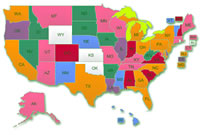People generally choose a bank based on three things: location, location-and, of course, location. But is your neighborhood bank the best financial institution for you? By examining your needs and available options, you can make sure that you are getting the best deal. And that research can really pay off, possibly saving you hundreds of dollars in fees and added interest each year.
Your Banking Expenses
First, let’s see how much you typically spend on banking services. Locate your bank statements for the past three months. In the chart below, fill in the total dollar amount you spent on banking services in the first column for each month, and then fill in the number of times the expense occurred in the second column. This will give you an idea how much you are being charged in total, and also how often each one of these events occurs. (By the way, don’t simply “vow to do things differently from now on”. If you have recently had lots of ATM or overdraft or money order fees, don’t ignore them.. First, we’ll work on changing your bank, then on changing yourself.![]()
Banking Expense Worksheet
| Item | Month #1 | Month #2 | Month #3 | TOTAL | |||
| $ | # of times | $ | # of times | $ | # of times | $ | |
| ATM surcharges | |||||||
| “Foreign” ATM fees | |||||||
| Other ATM fees | |||||||
| Debit card fees | |||||||
| Overdraft fees and interest | |||||||
| Money order fees | |||||||
| Monthly maintenance fees | |||||||
| Check printing | |||||||
| Per-check charges | |||||||
| Return check/NSF fees | |||||||
| Deposit slips | |||||||
| Call center charges | |||||||
| Low-balance penalties | |||||||
| Traveler’s checks | |||||||
| Cash deposit fees | |||||||
| Safe deposit box rental | |||||||
| Other bank fees | |||||||
| Totals | |||||||
Banking Services
Next, let’s figure out what you need from your bank. Put a check mark next to each service that you need from a financial institution.
| Banking Services Checklist | |
| Banking Service | |
| Online bill payment | |
| Debit and credit cards | |
| CDs | |
| Mortgage loans | |
| Overdraft protection | |
| Telephone banking | |
| High-interest checking accounts | |
| ATMs | |
| Money market accounts | |
| Brokerage services | |
| Convenience | |
| Direct deposit | |
| IRAs | |
| Cash deposits | |
| Safe deposit box | |
| Other (specify)_________________________ |
Additional Questions
Now that you know how much you currently spend and what services you need, let’s list a few additional questions.
- What is the interest rate you earn on your account?
- If the account does not pay any interest, if you switched to an interest-bearing account, would you have to pay extra service fees?
- What is the minimum deposit necessary to open the account? What is the minimum balance necessary to avoid a service fee once the account is open?
- What is the per-check charge? What is the charge for ordering new checks?
- What is the charge for a bounced check?
- Are canceled checks returned with the monthly statements? If not, do you get a photocopy of each check? What are the charges for having canceled checks returned, or for getting a copy of a check?
Banking Options
There are so many options: credit unions, thrifts, savings and loans, national banks, regional banks, local banks, new banks, old banks, and brokerage firms that act like banks. What’s a girl to do? Well, here are the answers to some common questions about choosing a bank:
1. What’s the difference between banks, thrifts, savings and loans, and so forth?
Not much, though thrifts and savings and loans tend to be smaller. But regardless of the name, all bank, thrift and savings and loan accounts are FDIC-insured and subject to similar regulations.
2. Are small banks better?
Often a small bank in the middle of a cornfield somewhere offers much better rates than SuperMegaBank that has a branch on every corner. That’s because the tiny thrifts and savings banks don’t have to maintain so many branches and pay so many employees, that they can afford to make their customers’ more money. But then again, the may not provide as many services or offer conveniently located branches and ATM machines.
3. Should I use a brokerage firm instead of a bank?
Many brokerage firms can do almost everything a bank can do, and less inexpensively. However, they can’t do everything a bank can do. First of all, many of them lack ATM networks, so you may have higher ATM fees. Also, in most case, you can’t just drop by a branch to deposit checks. Some may not allow automatic bill paying. They may not return your canceled checks to you, but instead provide you with a checkbook with the old “press hard to make a carbon copy” technology. If you do need a copy of a canceled check, you can request one, of course-for a fee.
4. What about credit unions?
Credit unions are nonprofit credit associations that look and act an awful lot like banks. Because they are nonprofit they can often offer significantly lower fees and pay significantly higher interest rates. However, they are usually much smaller than banks and don’t have as many ATMs, sophisticated services like business banking, or lots of branches.
5. Should I bank with an Internet or telephone bank?
Online and telephone banks often provide lower fees, free online banking, and pay much higher interest rates (like up to four times higher) on deposits. However, there is that little problem of not having a physical branch near your home or office. Another inconvenience to this kind of banking is that, other than direct-deposits, you’ll have to mail in your deposits-which means, no cash deposits, and no cash back from your deposits.
Check It Out
Now that you know your options, check with your local banks and over the Internet to see who has the best rates for your needs. For an Internet comparison, check out BankRate.com . Use your Banking Expense Worksheet to compute what your projected cost would be each month, and then make your move. Now you’re banking! ![]()







